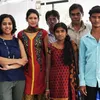[Startup Bharat] From 5 orders a day to a customer base of 25,000 – A Toddler Thing is giving baby care a sustainable twist
With an aim to make India plastic-free, Coimbatore-based startup A Toddler Thing is manufacturing and selling cloth diapers and other eco-friendly baby products.
Before plastic diapers took the parenting world off their feet, our grandmothers and mothers used cloth diapers, which were not just reusable but also eco-friendly. And with parenting hacks, came plastic diapers.
While these diapers are very convenient for parents, they can be harsh on the delicate baby skin. Moreover, disposable diapers eventually make it to the landfills, and worse, they take up to 500 years to decompose. With around 50,000 babies being born in India every day, we can only imagine the number of diapers that find their way to these landfills.
To put an end to this problem, and to make ‘India plastic free’, college friends Ashwanth Suresh Babu and Swathi Sri Aravind started A Toddler Thing (ATT) in December 2017.

Team A Toddler Thing
The Coimbatore startup is making sustainable and eco-friendly products for children. ATT manufactures reusable cloth diapers, organic muslin cotton swaddles, blankets, towels, jablas, nappies, and toddler toes (anti-slip shoes) for kids between zero to three-years.
At present, ATT products are available on 10 online marketplaces including Amazon, Flipkart, BabyChakra, etc., and are available across 50 retail stores in Coimbatore, Bengaluru, Kochi, Chennai, and Mumbai. It has so far, served the requirements of 25,000 mothers.
The startup was also awarded the ‘Best Eco-friendly Diaper Brand’ by KSP Awards in 2018.
Starting up early
Ashwanth(28) and Swathi (27) studied together at Kumaraguru College of Technology in Coimbatore, and have known each other since 2011. The former started an Entrepreneurship Club and eventually a student-run café called Namma Café in college, and Swathi was a part of both.
“Both our interests aligned towards entrepreneurship, and we organised many events related to business and entrepreneurship in college,” Ashwanth says.
However, after college, their paths diverged. Swathi joined Green Basket, an online supermarket, as Operations Head, and later worked with Aikya Enterprises as Head of Business Development.
Ashwanth, on the other hand, was a Data Strategist at Sawyer Studios and worked as a Digital Marketing Strategist at SVTM Jewels.
In 2016, the idea of sustainable baby products struck Swathi when she came across the use of cloth diapers outside India, and the amount of money her sister-in-law spent on buying her son’s disposable diapers.
She met Ashwanth in January 2017 to discuss the idea, and worked on the research and development for close to a month. Ashwanth and Swathi were then joined by their college friend and Co-founder of Namma Cafe, Lokesh Naveen Sivakumar (27), as a partner.
“We sourced products from China and a beta run was done through the website between December 2017 and May 2018,” says Ashwanth.
Once successful, for close to four months, team ATT worked on setting up a factory in Tiruppur, sourcing raw materials from across Tamil Nadu and manufacturing their own baby products. In September last year, they started selling A Toddler Thing’s in-house products.
As of now, ATT is a team of eight with two designers, one merchandiser, one brand strategist, one production manager and two admin staff.

ATT's reusable cloth diaper
Made in India
ATT sources the raw materials from across Tamil Nadu, and manufactures the baby products in Tiruppur.
“With our office is in Coimbatore, we set up the factory in Tiruppur since it had great manufacturing infrastructure. Also, the availability of skilled labour enabled us to manufacture all the products in-house,” says Ashwanth.
He says, ATT products are CPSIA (Consumer Product Safety Investigation Act) and GOTS (Global Organic Textile Standard) certified.
However, the team initially faced challenges creating awareness about the benefits of cloth diapering. “Many mothers were reluctant to wash diapers since it’s a messy affair,” says Ashwanth.
To overcome this, they came up with trial packs initially. They would distribute a starter kit consisting of two diapers and up to six absorbent inserts, and instructed mothers how to use them. “If they didn’t like the product, we promised a refund within 15 days,” he adds.
This helped them sell their product and the return rate was less than one percent.
ATT’s cloth diapers, which are one-size-fits-all, are machine washable and reusable for up to 300 washes.

Growing numbers
ATT’s diapers are priced from Rs 399 onwards, and its organic cotton jablas and nappies are priced from Rs 99.
The startup sells its products on an omnichannel network. While their products are available on nearly 10 ecommerce marketplaces including Amazon, Flipkart, and Hopscotch, they also sell their products offline.
“We empower and encourage homemaker mothers, who act as wholesalers, to sell the products through a commission-based retail programme,” says Ashwanth.
The programme was launched three months ago, and ATT has so far on-boarded 15 mompreneurs in Bengaluru and Chennai. ATT also supplies its products to 50 retail stores and hospitals in Coimbatore, Bengaluru, Kochi, Chennai, and Mumbai.
“We acquired our first customers through exhibitions in Chennai and Coimbatore, and through Instagram marketing,” Ashwanth adds.
When ATT started selling its in-house products, they would serve five orders a day. That has now increased to up to 60 orders per day, with an average cart size of Rs 1,500.
“Our main customer base is in Tamil Nadu, Kerala, Maharashtra, and Karnataka,” says Ashwanth.
The bootstrapped startup recorded a revenue of more than Rs 50 lakh in FY 2018-19, and is expecting to touch Rs 2 crore this financial year, and Rs 5 crore by 2020. The startup has also taken a loan of Rs 10 lakh this year to expand its reach.
Market overview and future plans
According to EPRA WISDOM, the market share for baby care products in India is $5 billion, of which baby clothing constitutes 65 percent. According to the founders, on an average, parents spend around Rs 55,000 for disposable diapers whereas if replaced with cloth diapers, they spend only around Rs 12,000 to Rs 15,000.
In India, some of the other brands dealing with cloth diapers include Bumpadam, Bumberry, and Superbottoms. Ashwanth says:
“Our USP lies in the range of products we offer. More importantly, while sustainable baby products are usually an expensive affair, we are breaking that myth by making products available for all segments of society.”
ATT is also looking to raise funds this year and plans to expand its customer base in North India, and is keen on entering the overseas market by the end of 2020.
(Edited by Megha Reddy)


![[Startup Bharat] From 5 orders a day to a customer base of 25,000 – A Toddler Thing is giving baby care a sustainable twist](https://images.yourstory.com/cs/2/3fb20ae02dc911e9af58c17e6cc3d915/GroupPic011568808062476png?mode=crop&crop=faces&ar=2%3A1&format=auto&w=1920&q=75)







